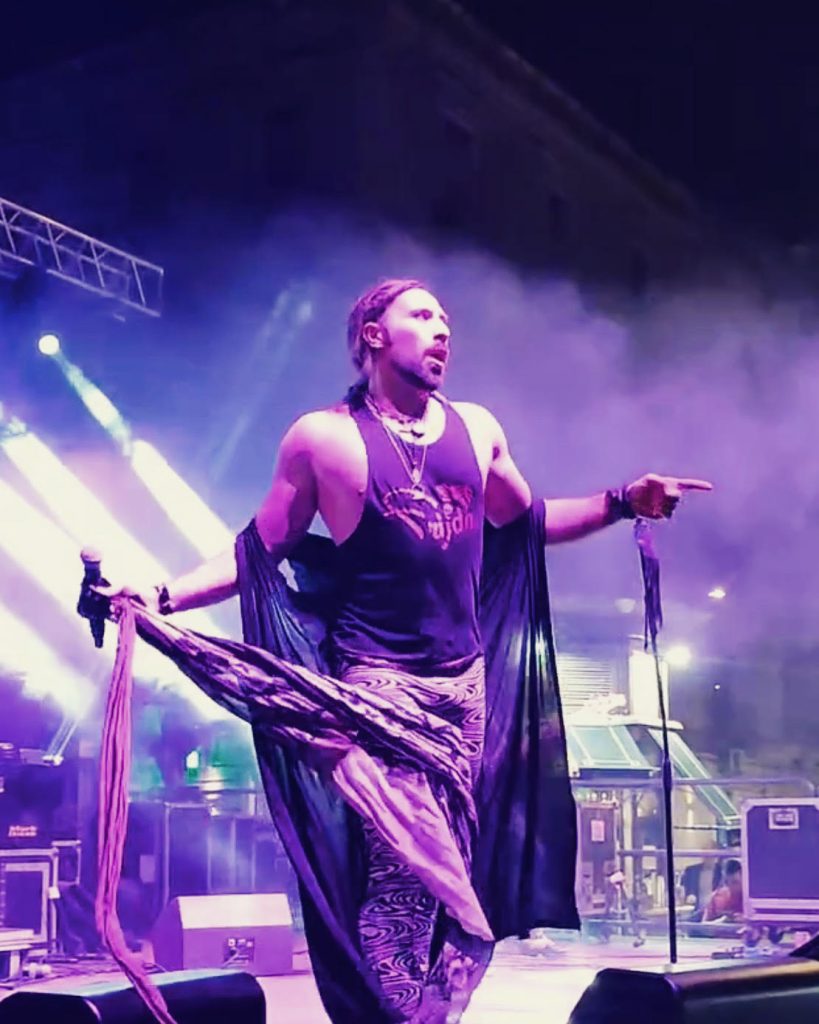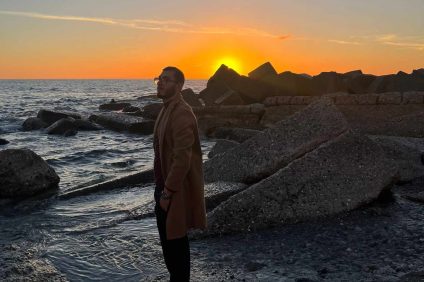The group lives in Sicily and makes music full of contaminations and cultural references.
How much have your Italian origins and the culture of your country affected your professional career?
Yes sure. Like many rock bands we could very well have written our lyrics in English, however, we have always preferred to keep our Italian and Sicilian origins. First of all because, by doing so, we were more credible. In fact, we believe it is important to be able to express yourself in your own language. In reality, we even went further by deciding to make a piece in Sicilian entitled "Ruggine" dedicated to Verga's "Malavoglia" precisely to pay homage to our cultural heritage, which is infinite. It was an experiment between Sicilian dialect and folk music that was released during the Covid period.
We also wrote an Italian text on Mario Rapisardi inspired by his work "Il lucifero". The song is called “Impure Poetry”. I believe that very few know who Rapisardi is: he is a great poet from Catania to whom one of the largest avenues in the city has also been named. They envied him throughout Europe, then he was attacked by the Church which banned him from literary texts.
In your opinion, is Italy still a meritocratic country as far as music is concerned? What could be the side effects of not having quality people in show business?
Absolutely not. Italy is a country that has adapted to the "new culture of the record market" that is: the bigger your wallet, the more you go on. If you have someone who invests in you behind you, you arrive regardless of whether you are good or not.
Today, everything is aimed more at the image than at the contents. There is more the desire to "destroy" in music rather than "to create". There is no longer that desire to “make art”. Anyone is fine. Everything is based on investment, everything is treated in a managerial way, what matters is only the result.
Once upon a time, a particular artist was sought, people invested in him because they believed in that "product". Today, marketing together with gossip build the artist to the detriment of art. All this is very sad.
As for the issue related to the side effects of not having quality professionals, I would say that we are already experiencing them. We are a society in decay and honestly, I haven't listened to the music offered by the various radios for years since the latter should spread culture and civilize the masses in some way instead of "barbarizing" them. This means of communication that is supposed to spread culture actually offers rubbish.
Is Italian music still popular abroad? In your opinion, what peculiarity makes it stand out on the international and global scene?
Italian music is liked abroad but it must be said that it is not the modern one. We are amazed when, for example, we discover that Pupo still gives concerts in Russia, as do Al Bano or Amedeo Minghi. They are singers who have marked a sincere historical period of music. When an artist makes music in such a context there are fewer constraints.

Today, to make an album, we are often subject to many limitations and however much an artist may have his own personality he must adapt to these logics otherwise he will not "pass" on the radio. Unfortunately it is as if we were asking Van Gogh not to draw sunflowers anymore but rather roses which are "more fashionable"... in doing so, however, Van Gogh would not be the artist we all know.
The peculiarity that allows Italian music to stand out is the fact that it is the homeland of the "bel canto". For example, tenor Jonathan Cilia Faro is doing just that: bringing this kind of music to America. The rock that my band makes is Italian rock, it is not comparable to the international one and it is perhaps difficult to export as it is a genre in itself.
Do you dream of taking your music abroad? Why?
Our dream is not so much to go abroad as to be able to continue doing what we do and it is not easy because it is the surrounding world that creates so many limits. Being able to make a career depends on the financial availability of the artist.
However, if we were able to go outside the peninsula we would be happy, but it would be enough just to be able to play throughout Italy. Our dreams are not so “arrogant”. Through music we simply want to convey our thoughts, touch the soul of other people, make them happy.
Today, however, we have adapted to reality. Before offering us something even abroad, producers are more interested in understanding how many followers we have and how much money we are willing to invest.
What were the main difficulties you had to overcome to become an established artist in Italy?
Money was the first difficulty even though I actually consider it a harm to humanity. In more than twenty years of experience I can say that the real difficulty was finding people who thought like me, white flies because, today, when a musician comes to ask me to play in the band the first question he asks me is: “How much will I be paid?”. I think, on the other hand, that we need to make music because it makes us feel good, then of course if you earn something, it's good, it's nice. In my opinion it's important to make music because you believe in what you're doing, you have something to say and all this is not easy. For this reason I often changed my musicians. We would also like to find a manufacturer who trusts us, who invests more in us.
As artists, what are your dreams still in the drawer?
The secret dream is to be able to continue doing what we do, try to reach as many people as possible. There is no purpose to become a star. Then of course, we are not hypocrites, we would like to be able to live on music, get up in the morning knowing that we are around the world. For example, I started making music because I dreamed of travelling, I saw the careers of great artists, their concerts, their tours, their stages. In our small way, honestly, we can't complain. We just wish we could amplify the emotions that music gives us.

If you could duet with an artist from the past, who would you choose and why? (Italian or foreign)
I have two myths that paved the way for me and pushed me to make this life and they are: Freddie Mercury and Steven Tyler. When I'm on stage I also use the half mast just like the leader of Queen. Then at the lego auction of the scarves which are instead dedicated to Steven Tyler, the lead singer of Aerosmith. I remember as a child I saw a video of this group and said: "I want to be like this" even though at the time I was a very shy, introverted child, I hardly spoke. Do you think my mother found out by chance from a friend that I could sing and performed. I was ashamed to say that I was a singer, that I had a band.
In your opinion, today, are there still Italian authors and/or composers who represent the true "Made in Italy" or are our songs also simply becoming a commercial product for the use and consumption of fashions?
There are many good artists even in this "infernal bedlam" which is the Italian market. But these are disposable artists and I doubt that they will still be around in twenty years time. On the other hand, it is much easier that you will still hear Queen, the Beatles, the Nomads, the PFM, in short, artists who have said something. Then it is true that there are also "disposable products" which are also well made but unfortunately they will continue to remain so and will automatically eliminate themselves. I must say that I am happy that abroad we are still appreciated as the "homeland of bel canto", of "O sole mio", of great composers such as Verdi, Puccini, Bellini. I'm a little ashamed when we export modern Italian music.
Maestro Jonathan Cilia Faro who nominated her has always supported the importance of meritocracy and philanthropy in the music field. Who is the singer you admire the most at the moment and in what do you think he contributes to bringing prestige to Italy?
Unfortunately, I don't like anyone of modern singers. Jonathan Cilia Faro instead he is doing some very nice things around the world. We will meet with him in July. For me this pop tenor has almost become a role model since he left Sicily and managed to become real. “I envy him” in the sense that he managed to do things that I would have liked too. Maybe he had a "more advantage" than me because he chose "bel canto", classical music. By doing rock and more Italian I feel more limited, I do a genre that not everyone likes.
Speaking of meritocracy and philanthropy, in your opinion among the young promises, which artist do you think deserve to be able to emerge? For what reason?
There are several artists that we like but we cannot define them as young promises such as Elisa, Mengoni, Pausini who have years of career behind them.
Among the young promises we don't see anyone in particular stand out, not because we think they don't exist but because they have a language that is too far from our conception of music.

Following your experience, in your opinion, is it easier to collaborate with other Italian artists or is it more stimulating to do it with foreign singers?
When we do live we love creating collaborations with other artists, sharing the stage, it's in our nature. We also love the contaminations, they are really inspiring.
In your opinion, what are the main characteristics that an artist must have in order to establish himself in Italy? Is talent enough?
Talent is important but if there are no people behind you who are able to believe in you and who are willing to make important investments, this talent will die within the walls of the rehearsal room.
What plans do you have for the near future?
First make a new album. The last one came out a year ago and it's always a great feeling to put a tangible sign of what you are and what you've done into a work. I would also like to try to do many lives, go on stage, feel contact with the audience and be a protagonist in this world.





